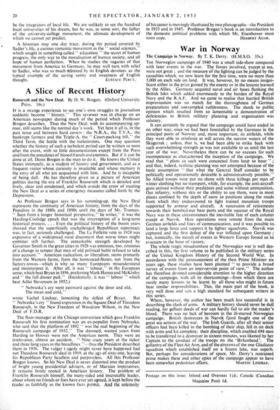A Slice of Recent History
IT is a strange experience to see one's own struggles in journalism suddenly become "history." This reviewer was in charge on an American newspaper during much of the period which Professor Brogan describes. Thus the New Deal, with its accompanying up- roar, still seems like the normal day's work. Yet here it all is, in the past tense and between hard covers : the N.R.A., the T.V.A., the bankrupt farmers and the Triple-A, the Court-packing bill," the Third Term, the battle with the isolationists. One may question whether the history of such a turbulent period can be written so soon after the event, with so little documentation except from the Press and from the anecdotes of biased friends and enemies. But if it can be done at all, Denis Brogan is the man to do it. He knows the United States intimately, as a student of history and government, and as a frequent visitor whose curiosity is insatiable and whose memory is the envy of all who are acquainted with him. And he is incapable of being dull. He...has therefore given us a picture of American politics (Luting the era of Franklin Roosevelt which is detailed and lively, clear and condensed, and which avoids the error of treating the New Deal as a series of emergency measures called forth by the Depression.
As Professor Brogan says in his summing-up, the New Deal .represents the continuity of American history, from the days of the Populists in the 1880s and 1890s until the days of Mr. Truman. " Seen from a longer historical perspective," he writes," it was the Harding-Coolidge epoch that was the interruption of a long-term historical process. . . . Even the political history of the boom years showed that the superficially unchallenged Republican supremacy was, in fact, seriously challenged. The La Follette vote in 1924 was expressive of a widespread rural discontent that worse times might embitter still further. The remarkable strength developed by Governor Smith in the great cities in 1928 was ominous, too, ominous of a change in temper that men of old political habit refused to take into account." American radicalism, or liberalism, stems primarily from the Western farms, from the homestead-States, not from the factory-towns—which is why so many Europeans misunderstand and misinterpret it. After all, it was " labour," in the European sense, which beat Bryan in 1896, preferring Mark Hanna and McKinley and " the full dinner pail." (Incidentally, it was " labour " which beat Adlai Stevenson in 1952.) "Nebraska's cry went eastward against the dour and old, The mean and cold," wrote Vachel Lindsay, lamenting the defeat of Bryan. But "Nebraska's cry "found expression in the Square Deal of Theodore Roosevelt, in the New Freedom of Woodrow Wilson, in the New Deal of F.D.R.
The floor-manager at the Chicago convention which gave Franklin Roosevelt his first nomination was an ex-populist from Nebraska, who said that the platform of 1892 " was the real beginning of the Roosevelt campaign of 1932." The doomed, wasted years from Harding to Hoover were not the American norm. They were an irrelevance, almost an accident. " Nine crazy years at the ticker and three long years in the breadlines "—thus the President described them in 1936. The vulgar tagedy might never have happened had not Theodore Roosevelt died in 1919, at the age of sixty-one, leaving his Republican Party headless and purposeless. All this Professor Brogan knows. So his New Deal is never distorted into the product of bright young presidential advisers, or of Mandan imperatives. It remains firmly rooted in American history. The problem or Franklin Roosevelt himself, the many-sided and inscrutable leader, about whom no friends or foes have ever yet agreed, is kept before the reader as faithfully as the known facts permit. And the solemnity of his career is movingly illustrated by two photographs—the President in 1933 and in 1945. Professor Brogan's book is an introduction to the domestic political problems with which Mr. Eisenhower must






























 Previous page
Previous page